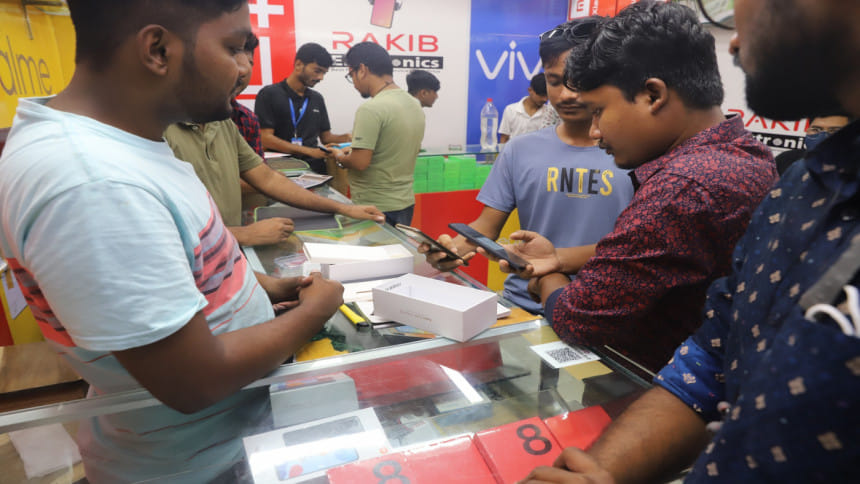Challenges persist for smartphone makers

Challenges have persisted for Bangladeshi smartphone manufacturers throughout the year due to the continuation of a sales decline, expansion of the grey market and an ongoing rise in smartphone prices.
Local manufacturers produced 57.5 lakh smartphones from January to October this year, down about 27 percent from 78.5 crore units in the same period a year earlier, according to Bangladesh Telecommunication Regulatory Commission (BTRC).
Industry experts said there has been a bigger decline in sales this year.
According to the Mobile Phone Industry Owners' Association of Bangladesh, smartphone sales plunged 33 percent year-on-year in the first nine months.
In 2021, 93 lakh smartphones were locally produced, and this figure rose to 1 crore in 2022.
Annual local smartphone production is poised to decline for the first time since 2017, when Bangladesh initiated local manufacturing enticed by substantial tax benefits, said industry people.
"Local production of handsets faced a significant downturn in 2023, encountering challenges such as prolonged issues with opening letters of credit (LC) for over a year," Rizwanul Haque, vice-president of the owners' association, told The Daily Star.
"The persistent problem contributed to a rise in smartphone prices. The industry is currently grappling with a pessimistic outlook as the dearer dollar continues to impact pricing dynamics," he added.
The adverse conditions have created a sombre atmosphere within the sector, reflecting the broader economic challenges faced by manufacturers, ultimately affecting the overall health of the mobile phone industry, he said.
According to him, people now buy handsets less frequently, only doing so when absolutely necessary due to the deteriorating economic conditions.
In the past, consumers tended to make phone purchases more regularly. This change in behaviour is a response to heightened inflation, which has reached a decade-high, prompting individuals to prioritise essential needs over discretionary spending, said a manufacturer.
Production of handsets in Bangladesh had made impressive strides in recent years, aided by the government's huge tax benefits unveiled in fiscal year 2017-18.
Since then, 16 plants have been set up, creating jobs for around 15,000 people.
Prior to the last fiscal year that began on July 1, 2022, there was about a 58 percent tax on smartphone imports whereas the tax on locally assembled and manufactured handsets was 15 percent to 20 percent.
Afterwards, it came to stand at 30 percent to 35 percent because of the imposition of a 5 percent VAT on each of the three stages of sales -- from the factory to distributors and retailers.
And in a further blow to manufacturers, the revenue authority has imposed more VAT at the production stage since the beginning of the current fiscal year.
An additional 2 percent VAT was slapped for the first time on production which make use of wholly locally-made components.
Moreover, the VAT applicable on handsets produced with at least two locally made components has been increased from 3 percent to 5 percent.
Similarly, the VAT on handsets assembled wholly with imported components has been increased from 5 percent to 7.5
According to industry players, another key factor in the downturn of the market is the expansion of the grey market.
The industry players have urged the government to consider alternative measures if reducing taxes appears impractical in addressing the issue of the grey market.
One of the proposed solutions involves the implementation of a National Equipment Identity Register (NEIR) to protect the local smartphone manufacturing sector.
Established by the BTRC in 2021, the NEIR is a system designed to ensure the use of legitimate mobile devices in the country by integrating their IMEI with the customer's national identification and SIM numbers.
Despite its creation, essential functions such as blocking fake, unauthorised, or cloned handsets on the network are not yet operational.
Earlier, Mohammad Mesbah Uddin, chief marketing officer of Fair Electronics, Samsung's local assembly partner, said although Bangladesh took the lead in implementing the NEIR, other countries have implemented it before Bangladesh.
For instance, Pakistan and Nepal utilise the NEIR to prevent illegal trade and to support local manufacturing opportunities.
He said though the government has invested in the NEIR infrastructure, it has not initiated the blocking of illegally imported mobile phones.

 For all latest news, follow The Daily Star's Google News channel.
For all latest news, follow The Daily Star's Google News channel. 



Comments